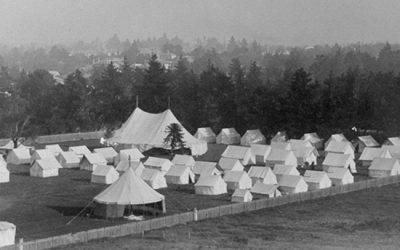Do Seventh-Day Adventists Have “Rules” for Clothing?
In today’s world, fashion can be a big deal, especially among young people.
Some religions, such as Amish, Orthodox Jews, or Mormons, have specific dress codes or special types of garments, whether for everyday living or special occasions, like church services or certain holidays.
But does the Seventh-day Adventist Church have official rules for apparel?
We’ll take a look at:
- Any statements, rules, or guidelines the Adventist Church might have
- What the Bible says about clothing
- Biblical principles that guide Adventists’ decisions for clothing
Let’s get to it.
What does the Seventh-Day Adventist Church say about how its members should dress?

Photo by David Lezcano on Unsplash
The Seventh-day Adventist Church does not have an official set of rules for clothing. There are no “forbidden” clothes or special garments. In fact, how we dress is likely similar to most other Christians. (We probably shop at the same stores most other people do, generally speaking.)
For the most part, our fashion choices come from biblical principles instead of a list of do’s and don’ts.
Having requirements for the whole Church would be challenging because, as a worldwide denomination, many members come from different cultures, backgrounds, and climates. What’s appropriate in one part of the world may be impractical or even offensive in another.
For example, people may wear less clothing in hot and humid climates compared to cooler and drier places! And some contemporary Adventist churches tend to dress more casually at their worship services while others are more formal.
Time is another factor for why we don’t have official rules. Fashion trends change. The availability of certain materials can vary as well.
When the Church’s co-founder, Ellen G. White, wrote about dress reform, some of the popular fashions in her time were different from what we see today.
However, some general impracticalities still exist. There are clothes that are more expensive than necessary, just because of brand or style. Some garments can still be restrictive, or even alter the natural body shape. And many types of clothes are still made for extravagance rather than function.
Because of these things, many Adventists still use the general advice of Ellen White. Much of this is practical—that clothing should be:1
- Of good quality
- Appropriate for the occasion
- Functional and suitable for service, rather than simply for display or attention
- And if possible, it’s best if clothing can fit easily, so it won’t obstruct circulation or make it more difficult to move and breathe freely
But before we talk further about how Adventists approach clothing, let’s first look at the Bible’s principles that relate to clothing and dress. Because ultimately, Scripture is the standard we strive to base all our decisions on.
What does the Bible say about clothing or fashion?
Overall, the Bible provides general principles rather than specific rules when it comes to clothing. God is more interested in our hearts than how we look (1 Samuel 16:7), so it makes sense that spiritual issues would have a stronger emphasis than style of dress would.
For example, Paul stresses the importance of “good works” expressed “in respectable apparel, with modesty and self-control” (1 Timothy 2:9-10, ESV).
This doesn’t mean our clothes determine the status of our faith or our salvation, or that we should dress with the intention of drawing attention to ourselves or to impress others. Paul is reminding us that all things about the way we live can be expressions of our beliefs. Including how we dress. That’s why we approach most forms of outward expression, such as jewelry, entertainment, possessions, or holiday celebrations, in the same manner.
When reading through Scripture, there are occasional mentions about specific articles of clothing, such as the priestly garments, head coverings, and mixed fabrics.2 But these were specific to the culture and the needs of that time.
What the Bible does provide plenty of, however, are timeless principles that we can rely on for guidance in choosing apparel.
Biblical clothing principles Adventists use
In light of the Scriptures, we navigate what to wear based on:
- Modesty
- Functionality and durability
- Health
- Stewardship
- Appropriateness
- Love for God and others
Modesty

Photo by Rana Sawalha on Unsplash
Modesty goes beyond what we wear. It’s an attitude of humility and respect that can allow people to see Jesus Christ in our lives. Modesty lets the inner beauty of our identity in Christ shine.
“Do not let your adornment be merely outward—arranging the hair, wearing gold, or putting on fine apparel—rather let it be the hidden person of the heart, with the incorruptible beauty of a gentle and quiet spirit, which is very precious in the sight of God” (1 Peter 3:3-4, NKJV).
Peter isn’t saying we can’t wear nice clothes. He’s reminding us to not let our attire define or hide our true selves.
Ellen White, in her counsel to fellow Christians, agreed that it’s a good thing for clothing or outfits to look pleasant, if possible.
“It should have the grace, the beauty, the appropriateness of natural simplicity. Christ warned us against the pride of life, but not against its grace and natural beauty.”3
Her concerns were primarily about the amount of money that could be spent on clothing and accessories—especially in her era of the late 1800s and early 1900s. She warned about the issues of greed and pride that could come from prioritizing expensive or flashy attire, all while so many people barely had enough money to afford even the most basic clothing.
“Money is a trust from God. It is not ours to expend for the gratification of pride or ambition. … You could bring happiness to many hearts by using wisely the means that is now spent for show.”4
She agreed with Scripture, saying that nothing we outwardly wear can compare with the soul’s attractiveness, or with the natural beauty of God’s creation (Matthew 6:28-30).5
The wise woman in Proverbs 31, for example, isn’t praised because she’s attractive or dressed in “fine linen and purple” (verse 22, CSB). She’s honored for her integrity, kindness, and resourcefulness. “Strength and honor are her clothing” (verse 25, CSB).
Functionality and durability
Another aspect of modest clothes is that they tend to be more functional.
Functionality means that something does what it’s designed for. Functional items of clothing aren’t just for show. They’re made for a defined purpose—whether that be office clothes, work boots, rain boots, workout clothes, or even the casual outfits we need just for doing things around the house or running errands.
So when we select our clothes based on functionality and practicality, we consider what they’re designed to do and what we need them for.
And durability comes into play for how well the clothes will assist in that function. A high-quality, long-lasting piece of clothing is a smarter choice than something that might look fun but is cheaply made.
Another factor of functionality is health. Our clothes should also serve the fundamental function of promoting, or at least not inhibiting, our health and our ability to live well (Ecclesiastes 3:12-13; 3 John 2).
Health

Photo by Олег Мороз on Unsplash
Whole-person health has been a special emphasis in the Adventist Church because of how it affects our quality of life and readiness to serve. So anything that could enhance or inhibit our health and abilities—even our clothes—is worth paying attention to.
Some tight-fitting or stiff clothes can restrict our range of motion or cut off circulation if we wear them for too long or try to do strenuous activities in them. This is one reason you don’t see people working out in skinny jeans or button-down shirts at the gym!
It’s also good to think about how some clothing types or features can present minor hazards that could turn into bigger hazards. For example, overly baggy pants or skirts that drag on the ground could be tripping hazards or get caked with germy dirt and grime. And some bedazzled, studded, or lacy clothing or accessories could get caught on or in things and even cause injury in some cases, depending on the place and situation.
Cleanliness is another factor to consider. Garments should be easy to wash and should also protect us from hazards that can cut, burn, or irritate our skin.
A wise man said that there’s a season for everything (Ecclesiastes 3:1), and this can include dress. Clothes should be appropriate for the season, climate, and occasion. This helps prevent weather-related health problems, like frostbite and heat exhaustion.
Healthy fashion choices are also important to Adventists because we believe that caring for our bodies is practicing stewardship.
Stewardship
Stewardship is the idea of managing resources that are not our own, or that have been given to us to care for. Think of a property caretaker, or a manager running a shop. Many Adventists see it as a broad term for how we use what God has given us—including our health, time, skills, possessions, opportunities, knowledge, etc.6 So you can see how this principle also applies to how we use our money and how we clothe ourselves.
As Christians, we want to invest in what has eternal value, like serving God and others. Christ promises to meet our needs—including clothes—when we focus on God’s kingdom and righteousness.7
We can use our money wisely by investing in durable clothes. While we don’t want to buy clothes simply for a brand name, it’s worth investing in something that’s higher quality and will last longer. It may be more expensive at first, but it saves us money in the long run because we don’t have to keep spending money on cheap trends.
A lot of trendy clothes can be cheaply made and still cost more than necessary. And a popular brand doesn’t automatically mean that its products are of good quality. Many times, the name on the tag is more about status than practicality or durability. As fashionable as brand-name jeans with pre-cut holes are, they likely won’t last as long as regular jeans.
It’s also worth investing in clothes that can be suitable for multiple functions or occasions, as well as some that fit specific requirements or uses that apply to your needs, hobbies, job, etc.
Appropriateness

Photo by cottonbro studio
Appropriateness has multiple factors, including occasion, season, age, gender, size, etc. While functionality is closely linked with appropriateness and modesty, it also has to do with humility and respect. We all have styles that express who we are and what we value. But our style of dress should make sense—especially in situations when clothes could communicate certain messages or priorities, or when some types of clothing or accessories could be overkill or distracting.
One way many Adventists express appropriateness and respect is by dressing up when they go to church on Sabbath. They see it as a special occasion and want to express respect toward God and others. It’s similar to how wedding guests dress formally to honor the bride and groom, and the meaningfulness of the occasion.
The level of appropriateness can vary, depending on the context of the situation and culture. For example, it’s generally expected to dress up in professional attire for a job interview. Dressing too casually, or wearing clothes that are wrinkled or mismatched, can give the impression that the applicant doesn’t respect the role or the company they would represent.
So as much as is reasonable or possible, it’s best for our clothes to match who we are, where we are, why we’re there, and what we do (Deuteronomy 22:5; Exodus 28:1-2).
Ultimately, clothing decisions boil down to motive and intent.
Like if we dress primarily for getting attention and admiration, that could get in the way of love and respect for others and God.
Love for God and others—the bottom line
Love is the baseline for our lifestyle choices.
We don’t need to stress over quantifying if or how a certain garment specifically communicates God’s love or not. It’s more about applying principles—being appropriate, considerate, and humble. And as far as we are able, making a goal for our outfits to express that too.
Our love for Jesus can motivate us to respect Him as our Lord and Savior, and we want our lives to accurately reflect it (1 Corinthians 6:19-20).
“Therefore, whether you eat or drink, or whatever you do, do all to the glory of God” (1 Corinthians 10:31, NKJV).
Likewise, we want to show honor towards others as well.
“Do nothing from selfish ambition or conceit, but in humility count others more significant than yourselves. Let each of you look not only to his own interests, but also to the interests of others” (Philippians 2:3-4, ESV).
“Owe no one anything except to love one another, for he who loves another has fulfilled the law. For the commandments, ‘You shall not commit adultery,’ ‘You shall not murder,’ ‘You shall not steal,’ ‘You shall not bear false witness,’ ‘You shall not covet,’ … are all summed up in this saying, namely, ‘You shall love your neighbor as yourself’” (Romans 13:8-9, NKJV).
We don’t want something like clothing to be a point of contention. Instead, we want to build each other up and unite to serve God and enjoy the lives He’s given us.
Adventism doesn’t have clothing rules for its church members because it’s a subjective area that depends on culture, occasion, function, or feasibility.
That’s why, just like it is for many of life’s options and preferences, our relationship with Jesus is our best guide. This frees us up to have a personal style and make our own practical decisions, while also making sure we aren’t overly influenced by shifting fads and checklists.
So, when we go shopping or rummage through the closet, we can consider the principles of modesty, appropriateness, and functionality while still making room for self-expression and preference.
If you’re interested in learning about how Adventists make other lifestyle choices, check out our page about jewelry or
- White, Ellen, The Ministry of Healing, pp. 288, 293. [↵]
- Exodus 28; 1 Corinthians 11:4-16; Leviticus 19:19. [↵]
- White, Ellen, The Ministry of Healing, p. 289. [↵]
- Ibid., 287. [↵]
- Ibid., 289. [↵]
- “Stewardship,” The Seventh-day Adventist Encyclopedia, p. 1425. [↵]
- Matthew 6:31-33; White, Ellen G, The Ministry of Healing, p. 289. [↵]
More Answers
What Does the Bible Say About Modesty
Seventh-day Adventists and Christians in general try to ensure their outward presentation and lifestyle glorify God. This often involves daily habits like the ways we hold conversations, the ways we dress and accessorize, and the ways we regard other people when we’re out and about.
How Do Adventists Make Movie and Music Choices?
How do Adventists decide what music to listen to and which movies to watch? Learn how Bible principles can help us make better entertainment choices.
Does the Seventh-day Adventist Church Believe in Paying Tithe?
Seventh-day Adventists believe in paying tithe and offerings based on the biblical command and our commitment to being wise stewards of God’s resources. These donations help fund the mission of the Adventist Church by supporting pastors, missionaries, church expenses, and evangelistic projects, among other things.
Seventh-day Adventist World Population and Demographics
The Adventist Church has more than 22 million members and 100,000 churches worldwide, plus a large system of hospitals, schools, and publishing houses. Learn more about this diverse church.
What Is a Seventh-day Adventist Camp Meeting?
Although camp meetings didn’t begin with the Seventh-day Adventist Church, they’re as much an Adventist thing as haystacks.
Camp meeting is an extended event for Adventists (and non-Adventists) of all ages to gather and participate in spiritual seminars and activities. During the event, attendees often camp in tents, campers, or RVs.
How to Join the Seventh-day Adventist Church
Whether you heard about the Seventh-day Adventist Church through a traveling evangelist, during your online searches, or through a loved one or relative, you might be considering joining yourself.
How Do Adventists Do Baby Dedications?
For Christians, dedication ceremonies for babies, also for older children, are an important time for parents and the church. It’s a special part of the worship service when parents present their young children to God and the church family. Both parents, along with the congregation, regard this as a solemn promise to be a Christ-like example to the child.
Do Adventists Celebrate Communion and Foot Washing?
Like many Christian denominations, Adventists regularly participate in communion, also referred to as the “Lord’s Supper” or the “Last Supper.” They also practice foot washing (John 13:1-20), or the “ordinance of humility,” during the service—which isn’t as common.
What is the Concept of “Present Truth” and Why is it Important?
Present truth is the principle that certain biblical truths are relevant to God’s people at specific times in history. God sends the Holy Spirit to reveal truths that help us better understand how to interpret and apply His Word in a present moment.
Do Seventh-day Adventists Celebrate Easter
Yes, many Seventh-day Adventists do celebrate Easter.
Does the Adventist Church Have Youth Ministry Programs?
The Seventh-day Adventist Church has been organizing and operating youth ministry programs since 1879.
In our opinion, youth ministry is one of the most important ministries a church can have.
Do Adventists Celebrate Birthdays?
Yes, most Seventh-day Adventists do celebrate birthdays because we see them as excellent reminders of the life God has blessed us with. And we celebrate them the same way everyone else does—with friends, family, presents, and a special meal.
Sola Scriptura—What It Means and Why It Matters
Sola scriptura is a term that originated during the Protestant Reformation. It represents the way many Christians view the Bible and its authority. While the idea is simple enough, there is so much more to sola scriptura than its basic definition.
What Do Adventists Offer for Young Adults?
In recent years, the age group often classified as “young adults” has been trickier to engage. It’s been a significant concern for Christian churches around the world. Though interestingly enough, similar observations regarding young adults have been coming up in conversations about the economy, the entertainment industry, politics, and more.
Do I Need to be an Adventist to be Saved?
The answer to this question is simply, “no.”
When it comes to salvation in Jesus Christ, all that is required of a person is to acknowledge Jesus’ sacrifice for us, believe that He has saved us, and claim the free gift of salvation that is always available to us. Salvation is not based on denomination.
Do You Have to Be Vegetarian to Be Adventist?
Of course not. Membership in the Seventh-day Adventist Church has never included any dietary requirements. However, there might be some reasons people might think that. So many Adventists are vegetarians or even vegan, and a plant-based lifestyle has many health benefits.
All About Seventh-day Adventist Colporteurs
The Seventh-day Adventist Church uses a variety of methods to spread the hope of the gospel to the world. One of these ways is through colporteuring, also called “canvassing” or “literature evangelism.”
What Is an Adventist Book Center (ABC)?
When you walk into any one of the many Adventist Book Center (ABC) locations, chances are you’ll be greeted by pleasant gospel music in the background, friendly employees, and row after row of Christian books, movies, Bibles, study guides, kids’ games, and more.
Do Seventh-day Adventists Celebrate Holidays?
Wondering whether your Adventist classmate or coworker keeps the same holidays you do? Perhaps you want to include them in some festivities, but you also want to respect their beliefs. Thus, you’re unsure of how to navigate the holiday question. Will they accept your invitation to the office Christmas party?
The Adventist Haystack (It’s Not What You Think) + 4 Recipes
Haystacks are basically a taco salad—with an Adventist spin on it! Most versions are vegetarian and offer an endless combination of tasty toppings. We eat them often because they’re healthy, scrumptious, and easy to make.
Do Seventh-day Adventists Believe in Medical Care?
The Seventh-day Adventist Church believes in and supports evidence-based medical care. In fact, medicine has played a significant part in our history, and today we run a major health system with hospitals, medical schools, and clinics throughout the world.
Why do Adventists Emphasize Religious Liberty?
Adventists see religious liberty as an essential human right. After all, God endowed humanity with freedom of choice from the very beginning. So we believe it’s best for governments to also support their citizens’ rights to worship based on their convictions.
All about Adventist Elementary Schools
The Seventh-day Adventist Church operates the largest Protestant education system in the world. A big part of this system is our K-8 elementary schools, or primary schools, as they’re known in other parts of the world.
What Are Pathfinder and Adventurer Clubs?
Like the boy or girl scouts, Pathfinders and Adventurers learn about nature and life skills. But what makes these clubs special is their purpose to bring young people closer to Jesus.
A Look at Adventist Colleges and Universities
On the outside, Seventh-day Adventist universities may not look much different than other college campuses. But the real differences are beneath the surface.
What Is ASI (Adventist-Laymen’s Services and Industries)?
ASI, which stands for Adventist-laymen’s Services and Industries, is a membership-based organization that provides support for Seventh-day Adventist laypeople (Adventist professionals who aren’t pastors).
What Are Adventist Evangelistic Meetings?
The Seventh-day Adventist Church puts a huge emphasis on sharing the gospel through evangelism, or sharing the gospel through preaching, teaching, and testimony. One of the ways we accomplish this is by organizing public events called evangelistic meetings.
Christian Summer Camps—A Cherished Adventist Ministry
School’s out, the sun’s shining, and your kids are thrilled to have the summer ahead of them. Then three days in, you hear, “I’m bored…”
Do Adventists Have Their Own Bible?
Adventists have some unique beliefs—you might be able to name some of them right now. The seventh-day Sabbath. Death as a sleep. Hell as nonexistence.
Didn’t find your answer? Ask us!
We understand your concern of having questions but not knowing who to ask—we’ve felt it ourselves. When you’re ready to learn more about Adventists, send us a question! We know a thing or two about Adventists.





























